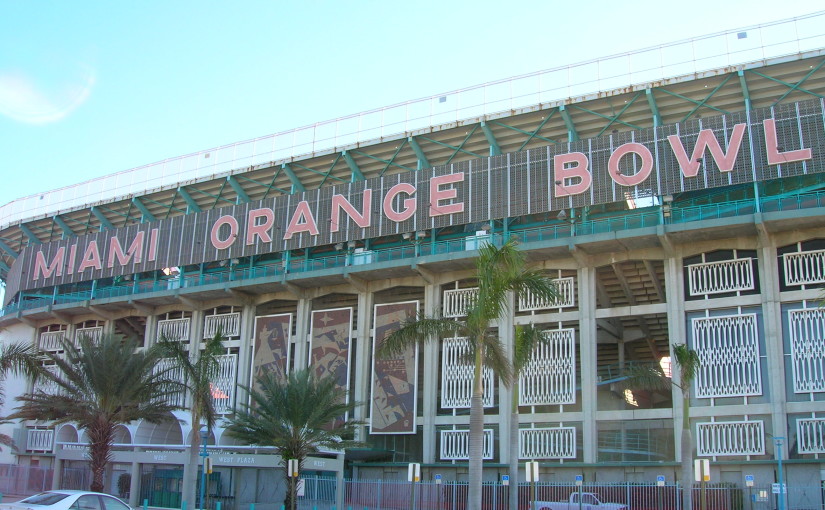By Ben Nicholson
December 7 – David Beckham is al last enjoying some Floridian sunlight on his campaign to exercise his contractual option to create an MLS expansion team. After three years of toiling, and scorching in political heat, Beckham has secured a site for his team’s home stadium. The MLS approved the location, getting Beckham over a hurdle that last week threatened to indefinitely suspend the idea.
MLS Commissioner Don Garber applied pressure on Beckham and Miami in saying, “if they can’t finalise their deal for a stadium, they’re not going to have an MLS team. If we reach that point – which I think we will have to figure out soon and I don’t have the date for that – then it’s conceivable that Sacramento could be higher on our expansion priority list.”
In response, Beckham’s group spokesman Tadd Schwartz indicated that Beckham’s fourth attempt at purchasing a location for a fully privately funded stadium could fail: “While Miami Beckham United is still hopeful we can secure the necessary private properties adjacent to the Marlins Park site, we are faced with the fact that some owners are not interested in selling or are seeking completely unreasonable prices.”
Following this with the claim that the group was “now in the process of considering alternatives.”
With the rug seemingly slipping from beneath Beckham and Miami’s feet, the group managed to revive the spluttering deal, leading to this announcement from Beckham’s group: “Miami Beckham United has secured a stadium development site at 650 Northwest 8th Street in the City of Miami’s historic Overtown neighborhood. We intend to create an assemblage of private and County-controlled land totaling approximately 9 acres in Miami’s urban core, within walking distance of multiple public transit options and the up-and-coming Miami River District. The private properties, which comprise the majority of the land, are under contract and we intend to purchase the County land at fair market value pending approval of our site by the MLS Board of Governors.
“Construction of our venue will be privately financed and we will work with Miami-Dade County Public Schools to establish our club as an educational resource for the community. We will also engage nearby businesses and residents as we develop our stadium design and take steps to enhance the neighborhood.”
The involvement of the Miami-Dade School Board, and a potential sports-dedicated ‘Beckham High School,’ is thought to be a method for avoiding paying property taxes.
How much of the progress is to down to Garber’s and the Beckhams group’s threat of looking elsewhere is unknown, and pragmatically unimportant now that the City and group are focusing on the next move.
Miami-Dade County Mayor Carlos Gimenez managed to cool the rhetoric somewhat, though, in mentioning that Beckham’s group has only signed a “non-binding letter of intent” to purchase the land from the County at fair market price. Miami-Dade commissioners must yet approve the deal and zoning changes.
Gimenez seemingly expects all to form order, as he added “[this letter of intent] may be the most significant step in our collective efforts to make MLS soccer a reality in Miami-Dade County. It also confirms that Miami Beckham United wants its franchise to be in our community.”
Garber has always seen Miami as a strategic stronghold, given the prominent Latin American locale and the proximity to state relative Orlando City SC, where the club will generate a natural rivalry. Beckham’s downtown enables capitalisation on both of these benefits.
Garber stated: “Their vision for a world-class venue within the urban core that is accessible by mass transportation is impressive, and we believe it will be an important part of the continued revitalisation of the area.”
The 25,000 soccer-specific stadium will be built where the American football stadium, the Orange Bowl (pictured), formerly stood.
Sacramento were licking its lips after hearing Garber’s comments last week. Though this lifeline dream may not be realised before Beckham has his day, Garber left some scraps for the disappointed capital of California.
He stated: “There is no shortage of demand for MLS expansion teams and we believe the opportunity exists to grow beyond our current plans… We will evaluate how to grow the league to 28 teams and establish a process and timeline for future expansion.”
And when that time comes Sacramento will likely be heading the guest list.
Sacramento is currently beyond Beckham’s Miami franchise in terms of stadium planning. The City Council already voted unanimously to approve a non-binding term sheet for the project.
The team has even gone as far as to release renderings of the 25,000 seat stadium, which is fully equipped with a 32-degree bowl and roof wrapping around the bowl that shades the seats while leaving the sun to shine on the pitch itself.
The stadium is modeled on the best of the stadiums around the world, drawing upon the neighborhood concept of English stadiums, building with the steepest stadium gradient possible so as to create an intimate environment for the home team and an intimidating one for opponents, creating a public plaza for use during non-game days, and providing a separate entrance for Republic FC supporters to enter together.
The project is estimated to cost around $226 million, of which around $180 million is expected to be funded privately.
Contact the writer of this story at moc.l1734845997labto1734845997ofdlr1734845997owedi1734845997sni@n1734845997osloh1734845997cin.n1734845997eb1734845997

